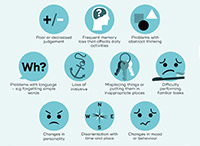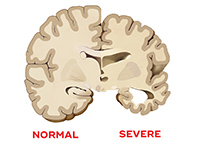The impact of dementia
Managing the impact of dementia is focused on three vital issues: care, treatment and prevention. With economic and personal costs of care rising, the need to delay the onset and progression of dementia, and to find cheap, effective and easily available treatments also grows. This is particularly important in a country such as Australia, with its vast population spread, which often results in great distances between specialist medical centres.
The only way forward is through research. In 2013, the Australian Government committed to boosting dementia funding to more than $60 million per year and established the National Institute of Dementia Research to coordinate priority research. That same year, the Queensland Brain Institute (QBI) at The University of Queensland established the Clem Jones Centre for Ageing Dementia Research (CJCADR), Australia’s first dedicated dementia research centre, now home to more than 90 exceptional researchers. These scientists are united by the deep desire to understand the fundamentals of dementia: how and why dementia starts, how to stop its progression, and how to develop effective treatments.
These aren’t easy questions to answer, but with bold ideas, bright people and hard work, we are determined to defeat this disease.
The growing economic burden of dementia
The cost of dementia to the health system and the economy is significant. In 2017, direct costs (mainly medical and aged care) and indirect costs (lost income and productivity) of dementia are set to be over $14 billion. Without effective treatments for dementia, those costs are predicted to skyrocket to almost $37 billion by 2056.
The Australian Government has recognised the urgency of the issue, and has directed resources towards ageing and dementia research. This includes the creation of the NHMRC National Institute for Dementia Research, part of a $200 million commitment to the World Dementia Council’s priority of achieving a five-year delay in dementia onset by 2025. It's hoped this commitment spans beyond its expiration in 2018.







